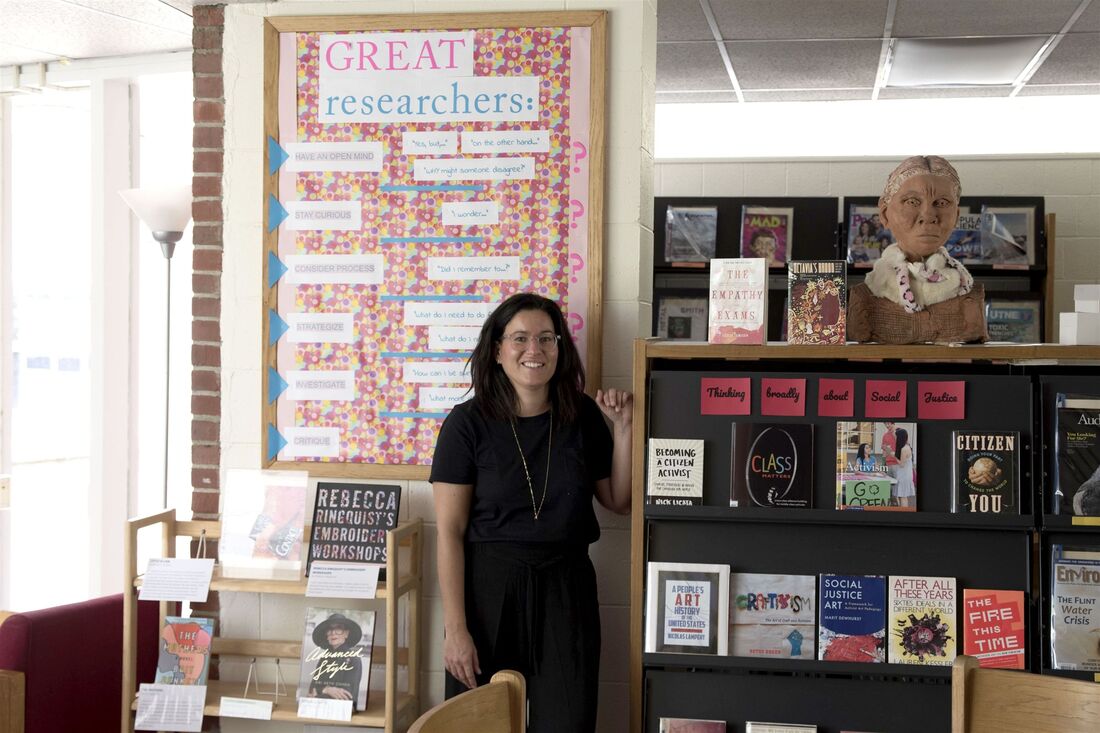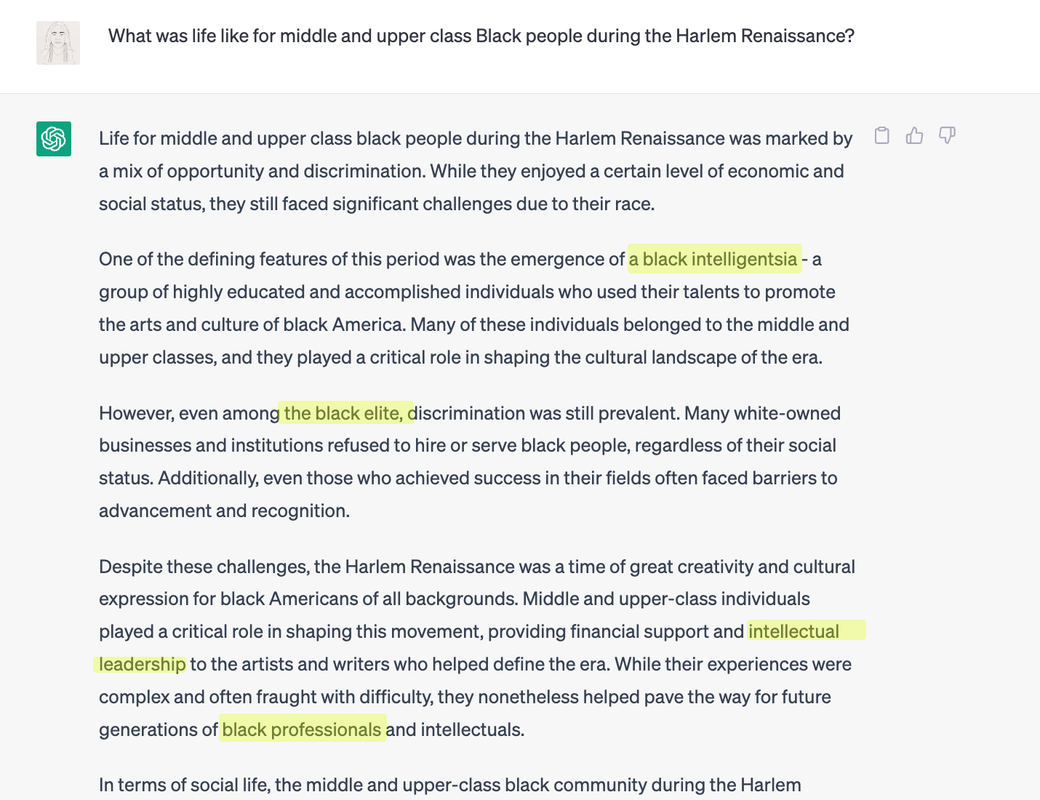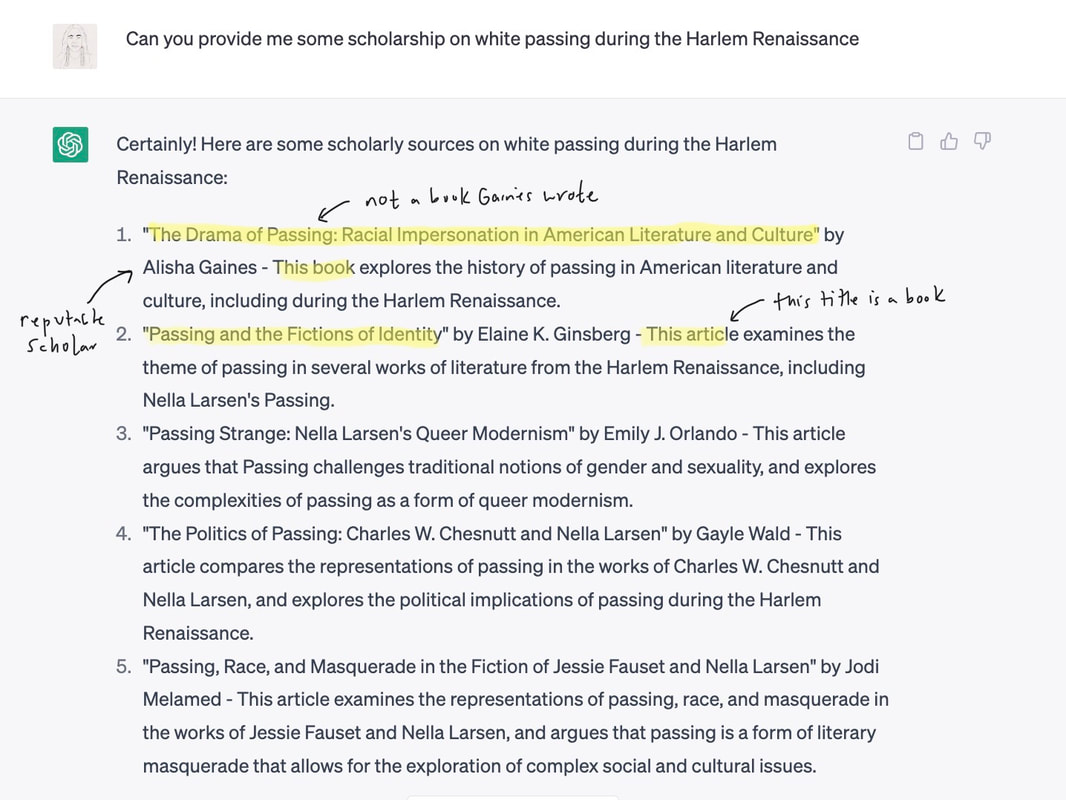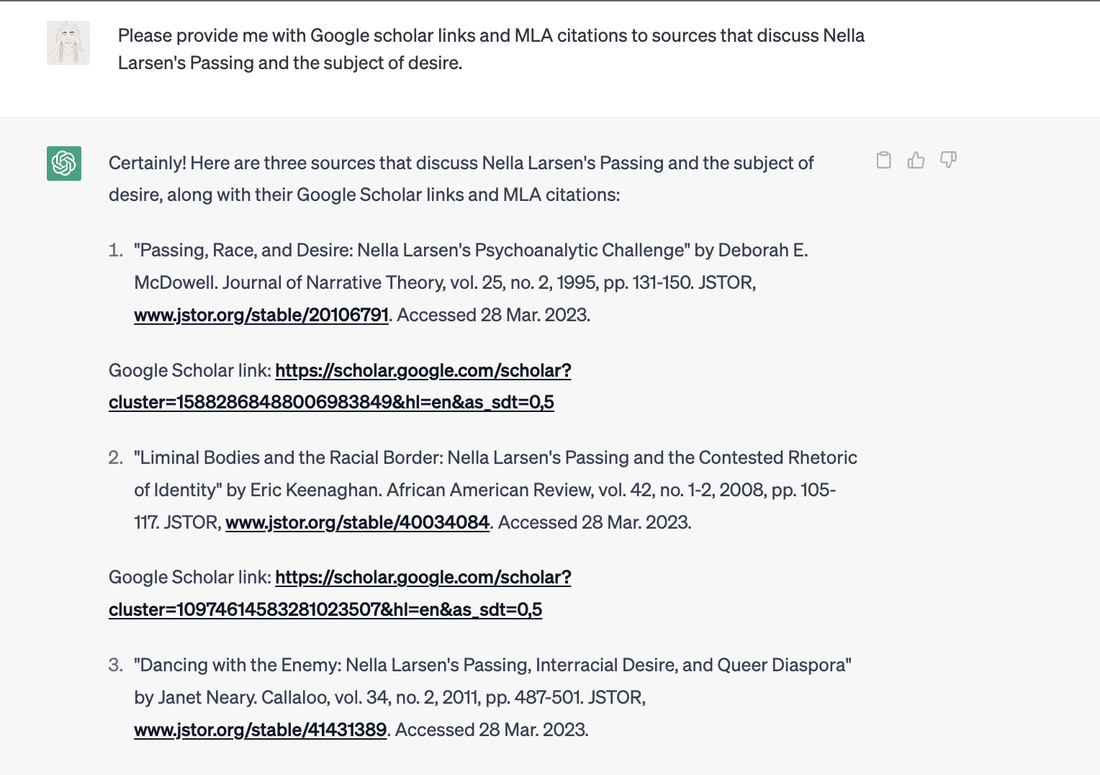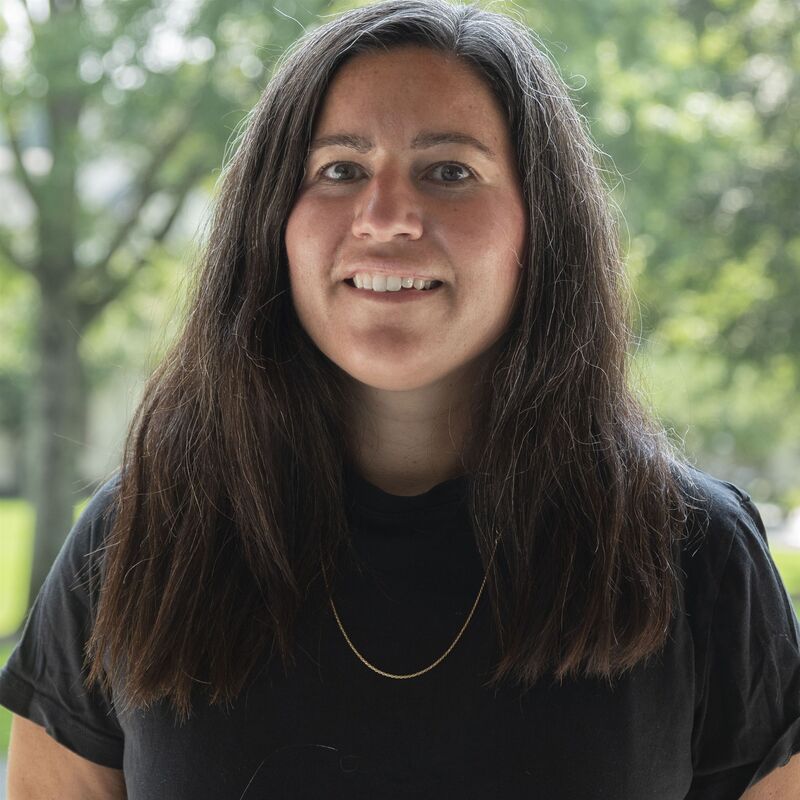| Jenna Wolf, Library Director Cambridge School of Weston is a day and boarding school in Weston, Massachusetts for students in grades 9 - 12 + PG. Librarians are often at the forefront of considering new tools to aid in the research process; ChatGPT is just another example of a tool that we can harness to engage our students with inquiry. But is it useful? In what ways and contexts? How do students imagine it as just one of the pieces of equipment in a larger research toolkit? |
At the Cambridge School of Weston (grades 9 – 12, a progressive boarding school), in deep partnership with the Humanities departments, we decided we wanted to name this tool everyone was talking about in the context of cheating, plagiarism, and world domination as a place of exploration and not fear. If our faculty are designing questions that engage students in critical and creative thinking, then ChatGPT becomes just another tool to engage students.
It is just that, we told our students: one tool. So, let’s try it, shall we?
Our first introduction to using ChatGPT with intention during the research process was during a 6-week course called Writing About Reading 2, where students’ tasks are to complete a close reading of a novella (Passing by Nella Larson) and craft a written literary analysis of the text. The research process involves a series of group and personal challenges designed by me (the librarian!) to build on the skills we want students to develop more deeply.
We’ve restructured the research process in this course several times to land on our current, and most effective, iteration: to ask students to understand more deeply the social context during the Harlem Renaissance (the setting of the novella) and that by doing that, their thesis questions and statements are stronger, more nuanced, and often promote original thought, rather than a regurgitation of the literary criticism that exists already.
As part of their initial digging into materials, we ask them to explore 10 examples of scholarship on the Harlem Renaissance, racial passing during that time, class conflict, desire and sexuality, and gender roles and expectations as they relate to race and class.
This felt like a natural place of initial disruption. What if we first asked students to ask ChatGPT a simple research question: What was life like for Black people of a certain social status during the 1920s? How might that be a useful starting place in the development of keywords and phrases?
It is just that, we told our students: one tool. So, let’s try it, shall we?
Our first introduction to using ChatGPT with intention during the research process was during a 6-week course called Writing About Reading 2, where students’ tasks are to complete a close reading of a novella (Passing by Nella Larson) and craft a written literary analysis of the text. The research process involves a series of group and personal challenges designed by me (the librarian!) to build on the skills we want students to develop more deeply.
We’ve restructured the research process in this course several times to land on our current, and most effective, iteration: to ask students to understand more deeply the social context during the Harlem Renaissance (the setting of the novella) and that by doing that, their thesis questions and statements are stronger, more nuanced, and often promote original thought, rather than a regurgitation of the literary criticism that exists already.
As part of their initial digging into materials, we ask them to explore 10 examples of scholarship on the Harlem Renaissance, racial passing during that time, class conflict, desire and sexuality, and gender roles and expectations as they relate to race and class.
This felt like a natural place of initial disruption. What if we first asked students to ask ChatGPT a simple research question: What was life like for Black people of a certain social status during the 1920s? How might that be a useful starting place in the development of keywords and phrases?
+Enter challenge 0. In groups of 3, students were given the following instructions:
- Identify one member of your group willing to ask ChatGPT questions (*a natural opportunity to discuss privacy and use and to make librarian and teacher OPENAI accounts available to any group that didn’t want to create an account).
- Ask ChatGPT a general question about the novella’s setting.
- Skim its results and Identify keywords or phrases that might be useful breadcrumbs.
- Share out discoveries.
Students combed ChatGPT’s response for keywords and phrases that might be useful breadcrumbs. Some of these discoveries included critical terms useful to finding peer reviewed sources in the databases including: the Black Elite, the Black Intelligentsia, social clubs, and social status (see example below)
We then keep track of these words and phrases so that the entire class can use these in the future.
Additionally, students reflected that while some critical keywords were discovered, ChatGPT’s responses were generally vague and didn’t provide many concrete details or a nuanced argument.
We then segued into the challenge we would have started with in the age before ChatGPT.
Challenge no. 1 is also a group challenge (groups of 3) and asks students in the group to:
Additionally, students reflected that while some critical keywords were discovered, ChatGPT’s responses were generally vague and didn’t provide many concrete details or a nuanced argument.
We then segued into the challenge we would have started with in the age before ChatGPT.
Challenge no. 1 is also a group challenge (groups of 3) and asks students in the group to:
- Pick one article from a list of scholarly articles on the historical and social context of 1920s Harlem and to answer: Why this article? Why might it be useful?
- Practice skimming and scanning and identify 2-3 keywords that may be useful as keywords for future searching (things not used in their everyday language – we describe this as the “language of scholarship”).
- Share out (usefulness of article, what they think it’s roughly about, and some keywords or phrases they discovered).
Challenge no. 2 Students reflected on how the process of skimming and scanning preselected scholarship was different than asking ChatGPT a general question about the novella’s setting and identified the following takeaways:
- Skimming preselected scholarship allowed them the space to grapple with more complex, and nuanced, arguments about the social and political context of the time period.
- There were more opportunities to engage with the general arguments (titles, abstract, section headings).
Students were asked to mine and interrogate ChatGPT’s response for accuracy. At first glance, students were excited by ChatGPT’s output. On closer examination, students tapped into their own research skills and determined that while ChatGPT produced scholars of the Harlem Renaissance with accuracy, the articles and books produced were deeply inaccurate; some were labeled as articles when they were books, and many titles simply did not exist.
We added a layer to our question and asked ChatGPT to include MLA citations and Google Scholar links with its list of sources:
We added a layer to our question and asked ChatGPT to include MLA citations and Google Scholar links with its list of sources:
ChatGPT produced what, again, felt like a convincing list but by this research challenge, knew it was time to interrogate what appeared there.
Their discoveries included that while the responses certainly looked to be in a citation style, it was not MLA, and appeared to be a brand-new style invented by ChatGPT. Additionally, Google Scholar and JSTOR links were dead or lead to completely different pieces of scholarship.
Additionally, while many of the authors were confirmed to be Nella Larsen scholars, they had not published those articles anywhere, and the articles did not appear in the journal titles and volumes identified. Students used an EBSCO Publication Search to determine these findings.
Summary Our students discovered, through this process, that their own research skills are developing in ways that allow them to interrogate ChatGPT’s responses and to easily identify accurate, authoritative sources. It provided students with clear examples that allowed them to see those skills in action and it demystified some of the usefulness of the tool. While it’s a starting point that can provide some breadcrumbs in the early stages of research, it requires students to tweak and adapt their questions with specificity (a critical part of the research process) but that doesn’t always produce accurate and reliable results like it would using databases and search engines.
Their discoveries included that while the responses certainly looked to be in a citation style, it was not MLA, and appeared to be a brand-new style invented by ChatGPT. Additionally, Google Scholar and JSTOR links were dead or lead to completely different pieces of scholarship.
Additionally, while many of the authors were confirmed to be Nella Larsen scholars, they had not published those articles anywhere, and the articles did not appear in the journal titles and volumes identified. Students used an EBSCO Publication Search to determine these findings.
Summary Our students discovered, through this process, that their own research skills are developing in ways that allow them to interrogate ChatGPT’s responses and to easily identify accurate, authoritative sources. It provided students with clear examples that allowed them to see those skills in action and it demystified some of the usefulness of the tool. While it’s a starting point that can provide some breadcrumbs in the early stages of research, it requires students to tweak and adapt their questions with specificity (a critical part of the research process) but that doesn’t always produce accurate and reliable results like it would using databases and search engines.
| Challenging students to play with many kinds of tools – be they large language learning models like ChatGPT or other AI-supported tools like Elicit or Quillbot - is a critical component of school librarianship today. As we continue to support teachers in designing thoughtful, timely research projects, it’s clear that assignments asking students to think more deeply and critically about a topic do not lend themselves easily to cheating or plagiarism using a tool like ChatGPT. But we can deploy the use of these tools throughout the research process as a way to develop and enhance students' skills for finding and identifying authoritative resources. Using the challenges above, dovetailed with other activities you do, can enhance the researching experience for students. Playing with places you can naturally insert AI tools like ChatGPT to have your students interrogate sources and interact with questions is a low stakes way to introduce them and have students be better prepared to work with these tools in the future. For students at the Cambridge School of Weston, it not only provided an interesting and playful angle to identifying sources, but it also allowed them the space to have their own aha moments about where their strengths are emerging around research. It validated for them that their own questions about authority reigned supreme and that being critical consumers of information requires skepticism, interrogation, and ultimately, the opportunity to confirm. |


